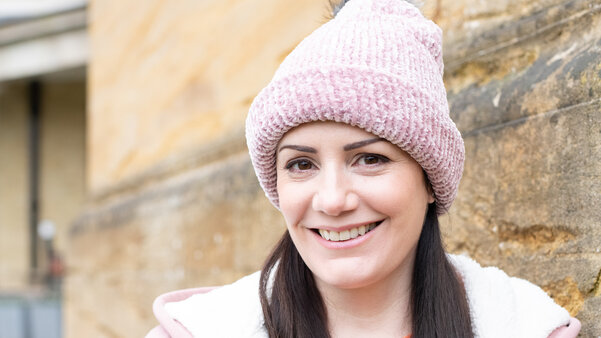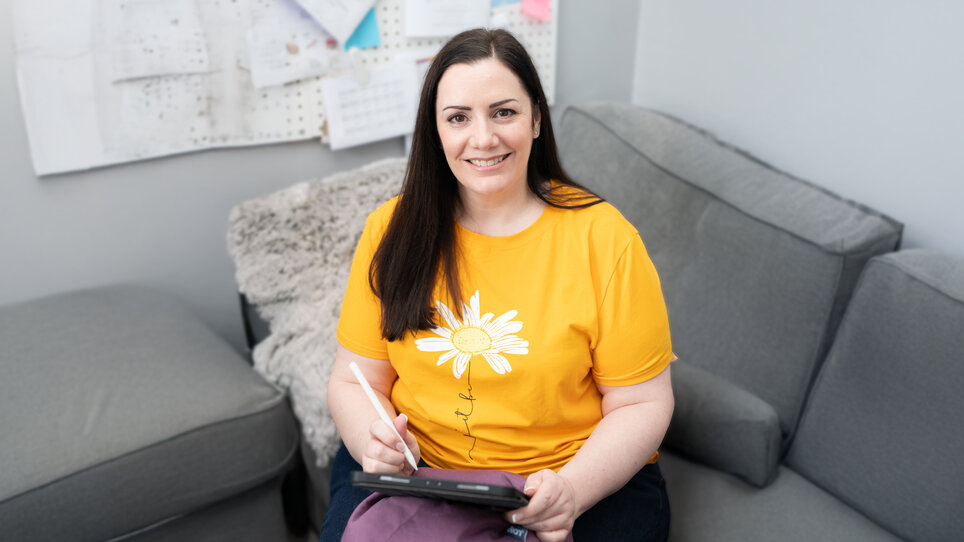
“I do try and explain how I see the world, but even if people don’t understand, saying it out loud with confidence helps me feel heard, seen and acknowledged.”
Jo
– on self-advocacy, creativity and challenging stereotypes during Neurodiversity Celebration Week
When did you first know or start to think you were autistic?
I was 43 years old.
My sister is a couple of years older than me, and our family sat around the dinner table as she told us my nephew had been noticed at school, that he might be autistic and that she was going for an assessment herself.
And then because I wanted to help, I did my own deep dive and looked into it. And I was like: ‘Oh my gosh, this is me.’
It made me realise that I’d actually looked into it many, many years ago. However, I realised that I’d dismissed it because it said that people who are autistic lack empathy.
I thought, ‘Well, I’m hyper-empathetic, so it’s clearly not me.’ And I left it.
But there is more understanding of autism these days, and as I looked into it more, I realised many autistic people are hyper-empathetic.
What was the diagnosis process like for you? What did it mean when you got your diagnosis?
It was a tough diagnosis to start with. I went to the GP, and she said: “You seem to have done all right up until now.”
To which I just went completely silent and couldn’t speak. If she’d looked at my history, she’d know I hadn’t done so well up until now and life had been extremely challenging – it was just a real throwaway comment.
I then got referred to the local mental health psychiatrist, which threw me again because autism isn’t a mental health condition.
I went along anyway, and the psychiatrist didn’t even really acknowledge me. He wrote a letter that stated – bear in mind that this was in 2019 – ‘You do have some Asperger’s traits, but there isn’t any help for autistic people as adults in your local area, so we won’t be going down a diagnostic path.’
Understandably, I had a complete meltdown and lost it.
I put in a complaint against him and the department, at which point they took it very seriously. I was quoting the Autism Act and the Equality Act.
I did actually get asked where would I like to go for my diagnosis. At which point, I said: “The Lorna Wing Centre.”
I’d done my research, and I knew that they were very understanding about women and girls, and they can spot the differences.
It was a six-hour interview. I cried at the end, absolutely relieved – the validation. Then I just had massive waves of self-compassion.
So, it was a bumpy ride.
What does being autistic, alongside ADHD and dyslexia, and having hypermobility Ehlers Danlos Syndrome (EDS) mean for you?
It means successfully navigating the world with its ups and downs, having a diagnosis feels like I’ve got a map now.
EDS is a lifelong connective tissue disorder, which causes pain, fatigue, dislocations and subluxations along with a host of other symptoms. It is important for me that neurodivergent people know there is a higher correlation to the 14 different EDS types than in the general population.
I really love my neurodivergences, and I was delighted to have these diagnoses. It gives me the power to help myself, even if that means asking for support and help with other things.
In 2023, I was diagnosed with ADHD and began the medication, and that’s been absolutely life-changing for me. It didn’t only help with focus and motivation, but it just stopped all the thoughts in my head. It’s enabled me to work again.
I thought to myself: ‘Do you know what, I’m going to start my own business, but I’m going to do it on my terms and work when I want to work and how I need to work.’
So, I started up my own business, PaperlyUK, and I went to my local Hertfordshire County Council Step2Skills and Access to Work.
Now, I’ve got two growing businesses.
As it’s Neurodiversity Celebration Week, what are the things you celebrate about yourself and how you think?
I think and feel in images. I do think I have alexithymia and I struggle to pinpoint my feelings and put them into words.
If somebody does ask me, I can sort of explain what I’m seeing, and they’ll often understand and go: ‘Oh, so you’re feeling a bit stuck.’ I’m like: ‘Yes’.

I’m such a hyper-visual person. I’m always full of ideas, and I can channel this into my businesses. I’m just ploughing my expertise in visualising and imagery into my surface pattern design business, which is called Infinity Designer.
I’ve also got Irlen syndrome. I’ve just got my Irlen filters through Access to Work, so I’m also celebrating that I can actually look at words and they stay there. Before, they would move around or blur, but when I put the glasses on, all I see are the words – it’s incredible.
You’re a member of your local authority’s Autism Co-Production Board. Based on your experience, how can society work more effectively with autistic or neurodivergent people?
It’s just a matter of learning and being open to learning. But I don’t think it’s enough for me to expect that others just understand me without me having to put in some input.
So I will gently educate where I can.
I have to think about the fact that I didn’t understand autism or neurodivergence until only a few years ago, so I got confused too.
I do try and explain how I see the world, but even if people don’t understand, saying it out loud with confidence helps me feel heard, seen and acknowledged that there are differences, and that’s okay.
You recently contributed to the book Beyond the ordinary by Mandy Nicholson, featuring 29 other neurodivergent and creative women talking about their businesses and creative pursuits. What was that process like for you?
Mandy Nicholson is my neurodivergent business coach, and she invited me to add a chapter to her book. She’s a multi-millionaire, autistic and she’s also got autistic children, so she really understands about neurodivergence.
It was an invaluable process to me, going through and writing my own story.
I’ve actually had eight formal years of education in art and design, including a master’s in illustration, but I couldn’t work out how to get a job. No one helped me.
I finished university, went back to live with my parents and didn’t understand what I was meant to do.
I got into a job that I really didn’t enjoy and wasn’t creative at all, and I ended up being medically retired and burnt out from it.
But it did turn around, and things are looking up now.
Not everyone will want to start their own business, but there is support and help out there for neurodivergent people who want to start something – like Access to Work, your local council or apprenticeships.
Get all the help and support you can from people. The first person to help might not be great, but the second or third person may be great, and it might be just what you need.
Keep going.
Neurodiversity Celebration Week is also about challenging stereotypes. What stereotype about autism do you want to challenge the most?
That autistic people don’t have any empathy. I think that’s still hanging around. Some autistic people just don’t show it in the same way that a neurotypical person might.
What does autism acceptance mean to you?
It means not giving ‘that look’ – that stare or that judgment.
It means being open to understanding. It means being compassionate and supportive of differences.
